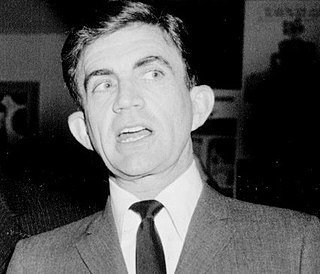
Blake Edwards was an American film director, producer, screenwriter, and actor.
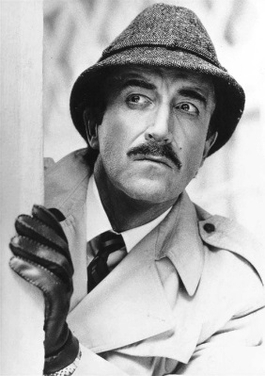
Inspector Jacques Clouseau, later granted the rank of Chief Inspector, is a fictional character in Blake Edwards' farcical The Pink Panther series. He is portrayed by Peter Sellers in the original series, and also by Alan Arkin in the 1968 film Inspector Clouseau and, in a cameo, by Roger Moore in the 1983 film Curse of the Pink Panther. In the 2006 reboot and its 2009 sequel, Clouseau is portrayed by Steve Martin. Clouseau's likeness also appears in the Pink Panther animated cartoon shorts and segments, where he is known as simply "the Inspector". More recent animated depictions from the 1970s onward were redesigned to more closely resemble Sellers, and later Martin.
The Pink Panther is an American media franchise primarily focusing on a series of comedy-mystery films featuring an inept French police detective, Inspector Jacques Clouseau. The franchise began with the release of the film The Pink Panther in 1963. The role of Clouseau was originated by and is most closely associated with Peter Sellers. Most of the films were written and directed by Blake Edwards, with theme music composed by Henry Mancini. Elements and characters inspired by the films were adapted into other media, including books, comic books, video games and animated series.

Isadore "Friz" Freleng, credited as I. Freleng early in his career, was an American animator, cartoonist, director, producer, and composer known for his work at Warner Bros. Cartoons on the Looney Tunes and Merrie Melodies series of cartoons from the 1930s to the early 1960s. In total he created more than 300 cartoons.

Herbert Tsangtse Kwouk, was a British actor. He is perhaps best known for his role as Cato in the Pink Panther films. He made appearances in many television programmes, including a portrayal of Imperial Japanese Army Major Yamauchi in the British drama series Tenko and as Entwistle in Last of the Summer Wine.

The Inspector is an American series of 34 theatrical cartoon shorts produced between 1965 and 1969 by DePatie–Freleng Enterprises and released through United Artists. The cartoons are dedicated to an animated version of Inspector Clouseau comically battling against a rogues' gallery of internationally styled villains.

A Shot in the Dark is a 1964 comedy film directed by Blake Edwards in Panavision. It is the second installment in The Pink Panther film series, with Peter Sellers reprising his role as Inspector Jacques Clouseau of the French Sûreté.

Trail of the Pink Panther is a 1982 comedy film directed by Blake Edwards and starring Peter Sellers. It is the seventh film in The Pink Panther series, the first film in the series following Sellers's death and also the last in which he appeared as Inspector Clouseau. Sellers died 18 months before production began; his performance consists entirely of scenes from previous films. The newly shot material in the film stars Joanna Lumley as journalist Marie Jouvet searching for the missing Clouseau – and running afoul of the inspector's enemies who do not wish to see him return.
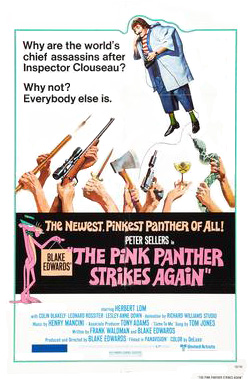
The Pink Panther Strikes Again is a 1976 comedy film. The fifth film in The Pink Panther series, its plot begins three years after the conclusion of The Return of the Pink Panther. Unused footage from the film was later included in Trail of the Pink Panther (1982), released after Peter Sellers's death.

The Return of the Pink Panther is a 1975 comedy film and the fourth film in The Pink Panther series. The film stars Peter Sellers returning to the role of Inspector Clouseau for the first time since A Shot in the Dark (1964), after having declined to reprise the role in Inspector Clouseau (1968). The film was a commercial hit and revived the previously dormant series and with it Peter Sellers' career.
The Pink Panther is a series of films featuring the fictional Inspector Clouseau, played by Peter Sellers, that began in 1963.

Curse of the Pink Panther is a 1983 comedy film and a continuation of The Pink Panther series of films created by Blake Edwards in the early 1960s. The film was one of two produced concurrently following the death of the series' star Peter Sellers. Whereas the previous film Trail of the Pink Panther made use of unused footage of Sellers as Inspector Clouseau and starred Joanna Lumley as journalist Marie Jouvet, Curse attempted to relaunch the series with a new lead, Ted Wass, as inept American detective Clifton Sleigh, assigned to find the missing Inspector Clouseau.
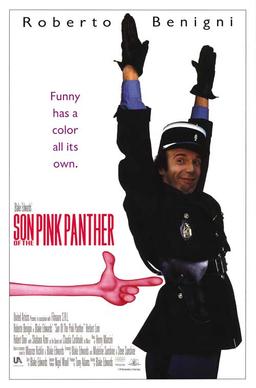
Son of the Pink Panther is a 1993 comedy film. It is the ninth and final installment of the original The Pink Panther film series starting from the 1963 film. Directed by Blake Edwards, it stars Roberto Benigni as Inspector Clouseau's illegitimate son. Also in this film are Panther regulars Herbert Lom, Burt Kwouk and Graham Stark and a star of the original 1963 film, Claudia Cardinale. It was the final film for both director Blake Edwards and composer Henry Mancini; Mancini died on June 14, 1994, and Edwards retired from film-making two years later in 1995.

The Pink Panther is a 1963 American comedy film directed by Blake Edwards and distributed by United Artists. It was written by Maurice Richlin and Blake Edwards. It is the first installment in The Pink Panther franchise. Its story follows inspector Jacques Clouseau as he travels from Rome to Cortina d'Ampezzo to catch a notorious jewel thief known as "The Phantom" before he is able to steal a priceless diamond known as "The Pink Panther". The film stars David Niven, Peter Sellers, Robert Wagner, Capucine and Claudia Cardinale.
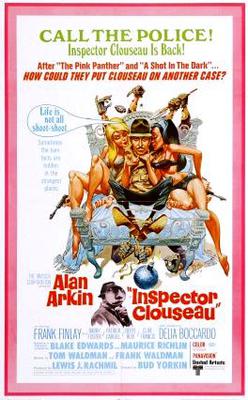
Inspector Clouseau is a 1968 British comedy film, and the third installment in The Pink Panther film series. It was directed by Bud Yorkin, written by brothers Frank Waldman and Tom Waldman and stars Alan Arkin as the title character. It was filmed by Mirisch Films at the MGM-British Studios, Borehamwood and in Europe.
The Mirisch Company was an American film production company owned by Walter Mirisch and his brothers, Marvin and Harold Mirisch. The company also had sister firms known at various times as Mirisch Production Company, Mirisch Pictures Inc., Mirisch Films, and The Mirisch Corporation.

The Pink Panther is a fictional animated character who appears in the opening and/or closing credit sequences of every film in The Pink Panther series except for A Shot in the Dark and Inspector Clouseau. In the storyline of the original film, the "Pink Panther" is the name of a valuable pink diamond named for a flaw that shows a "figure of a springing panther" when held up to the light in a certain way; in the credits this was translated to an animated pink panther. Only the first Pink Panther film and the second sequel, The Return of the Pink Panther, featured the diamond.

"The Pink Panther Theme" is a jazz composition by Henry Mancini written as the theme for the 1963 film The Pink Panther and subsequently nominated for the Academy Award for Best Original Score at the 37th Academy Awards but lost to the Sherman Brothers for Mary Poppins. The eponymous cartoon character created for the film's opening credits by David DePatie and Friz Freleng was animated in time to the tune. The tenor saxophone solo was played by Plas Johnson.

The Pink Panther 2 is a 2009 American comedy-mystery film directed by Harald Zwart. It is the eleventh installment in The Pink Panther film series and the sequel to the 2006 film The Pink Panther, a reboot of the popular comedy series. The film was released on February 6, 2009 in North America. In the film, Inspector Clouseau must team up with detectives from other countries to rout a daring burglar, The Tornado, who has returned after a decade's inactivity.
















